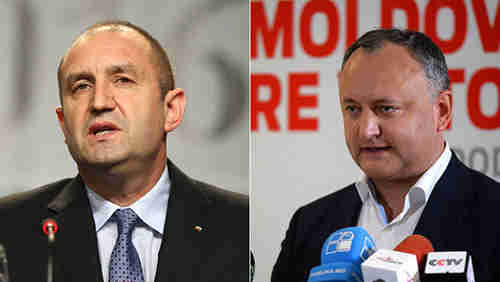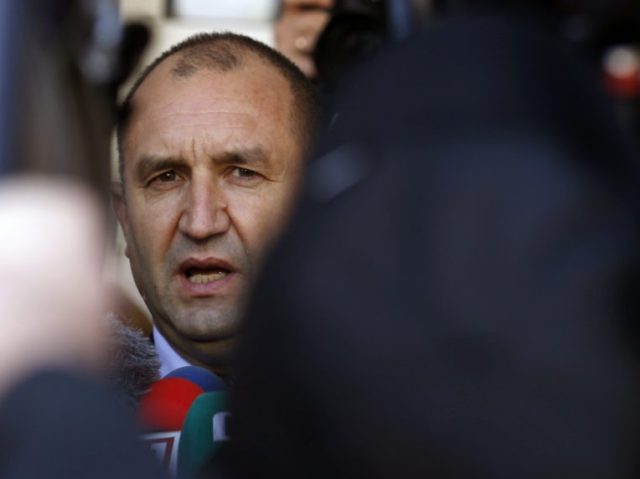This morning’s key headlines from GenerationalDynamics.com
- Bulgaria: Socialist pro-Russian Rumen Radev wins election as president
- Moldova: Socialist pro-Russian Igor Dodon wins highly polarizing presidential election
Bulgaria: Socialist pro-Russian Rumen Radev wins election as president

Presidents-elect: Rumen Radev (Bulgaria), and Igor Dodon (Moldova)
Bulgaria’s prime minister resigned on Monday after it became clear that his party had lost badly in Sunday’s presidential election. The pro-Moscow Socialist candidate Rumen Radev won an overwhelming 59.4% of the vote, compared to 36.2% for his center-right opponent.
Bulgaria is a member of the European Union, and is also a member of NATO, creating a potential political conflict with Russia. Radev has frequently stated his support to end the sanctions on Russia for invading and annexing Ukraine’s Crimean peninsula, and this week he praised U.S. President-elect Donald Trump for “seeking more dialogue” with Russia’s President Vladimir Putin.
Bulgaria is a mostly Orthodox Christian country in eastern Europe, on the border with Turkey. Like other east European countries, Bulgarian officials fear the consequences of the collapse of the EU-Turkey refugee deal, which would result in a massive new influx of refugees from Syria. As a result, Bulgaria is building a fence along its border with Turkey and Greece.
Bulgaria also has migrant troubles in the other direction. In 2014, Germany’s Chancellor Angela Merkel is warning Britain’s Prime Minister David Cameron that Britain might have to leave the European Union if Cameron insists on adopting quotas that would limit the number of migrant workers coming to Britain from eastern European countries, like Bulgaria, Poland and Romania. The irony is enormous. RFE/RL and EuroNews and Greek Reporter (11-Aug)
Related Articles
Moldova: Socialist pro-Russian Igor Dodon wins highly polarizing presidential election
Socialist Party leader Igor Dodon won Moldova’s presidential election on Sunday with 52.2% of the vote, after campaigning to pursue closer ties with Russia rather than the EU.
However, unlike the situation in Bulgaria, the opposing government is not resigning. The opposition leader Maia Sandu said that the elections were neither free nor fair. and accused opponents of using “dirty methods” against her.
Moldova’s people are extremely polarized in the political conflict between the European Union and Russia. At the center of the conflict has been the secessionist and mainly Russian-speaking province of Transnistria (also called Trans-Dniester or Transdniester). Russia has thousands of troops stationed there, supposedly as peacekeepers. At the time of Russia’s military invasion and annexation of Ukraine’s Crimean peninsula, the people of Transnistria, which is on Ukraine’s border, were expressing the hope that Russia’s military would annex Transnistria as well.
In fact, Dodon is apparently prepared to grant Transnistria a special status, short of full secession:
For the first time in the recent seven years, all the pro-Moldova and pro-state forces have united for friendship with Russia, for neutrality, for our Orthodoxy, for the unity of the country in settling the Transnistria conflict. The first step has been made…
“My position remains unchanged,” he continued. “We should grant a special status to Transnistria. … I believe, the country’s federalization is the only solution.”
On Monday, up to 3,000 mostly young Moldovans marched to the offices of the Central Election Committee in Chisinau, the country’s capital city, shouting “Down with the Mafia!”
There are fears that a pro-Russian government in Chisinau will result in an expansion of Russian military forces in Moldova, and this would cause a hardening of relations with Ukraine and Romania, and indeed with the entire European Union. Al-Jazeera and Tass (Moscow) and RFE/RL
Related Articles
- Mass protests force Moldova to choose between Europe and Russia (26-Jan-2016)
- Russian troops approach Ukraine’s border, threaten port city Mariupol (05-Nov-2014)
- Russia threatens to invade Ukraine from East and West (15-Aug-2014)
KEYS: Generational Dynamics, Bulgaria, Rumen Radev, Ukraine, Crimea, Russia, Vladimir Putin, Turkey, Germany, Angela Merkel, Poland, Romania, Moldova, Igor Dodon, Maia Sandu, Transnistria, Trans-Dniester, Transdniester
Permanent web link to this article
Receive daily World View columns by e-mail

COMMENTS
Please let us know if you're having issues with commenting.